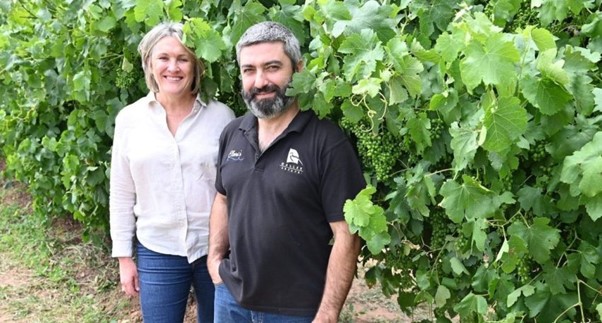Five key targets have been unveiled in a new Riverland Wine Industry Blueprint, as the state government announces more funding to support local growers and producers facing “one of the industry’s toughest periods”.

Riverland Wine's Lyndall Rowe and Jim Markeas.
The blueprint was launched in the Riverland by Primary Industries and Regional Development Minister Clare Scriven, who said it would be backed by $200,000 government funding over two years to support recommendations giving the industry a path forward.
“This investment will help support the region’s grape growers and winemakers to get on the road to recovery,” she said.
The blueprint comes as the latest Australian Wine: Production, Sales and Inventory report from Wine Australia stated that the recent lowest annual production of wine in 15 years was not enough to reduce pressure on inventory levels.
Growers and producers in the state’s wine engine room have faced crippling market conditions that led to a glut in red wine, many told by wineries last harvest season there was so much red wine left in tanks there was no room to buy and store the upcoming vintage.
“Growers and producers in the Riverland wine region have been through what can only be described as one of the industry’s toughest periods,” Scriven said today.
Shiraz and cabernet grapes were left to wither on vines as the industry grappled with the oversupply of red wine grapes, a global fall in alcohol consumption and supply chain disruptions.
Riverland Wine stepped up last year to negotiate a way forward, investing $50,000 of cash and in-kind support to producing a plan to steer the industry forward, with an additional $100,000 in government funding.
Its blueprint, developed with the support of Wine Australia and the Wine Grape Council of SA, outlines new opportunities for the local wine industry to fill gaps in the market by developing new and sustainable grape and wine products.
These include more interesting varietal mixes, lighter style reds, more white wine, low and no alcohol wines and a range of environmentally friendly packaging options.
The blueprint outlines the need to build the Riverland’s reputation globally as a wine region amongst domestic and international consumers and trade customers – drawing attention to existing experiences and attracting new investment to the region.
Riverland Wine Industry Blueprint’s five priorities include:
- A rapid transition to more sustainable production levels
- Becoming an adaptable wine region responding to trends and filling market gaps
- Developing and promoting a meaningful regional identity
- Developing passionate leaders and a skilled workforce
- Supporting agile wine businesses that are sustainable and profitable
Riverland Wine executive officer Lyndall Rowe said the blueprint would support the local wine industry as it continues to deal with challenging conditions to improve productivity and “ensure sustainability of the sector over the next decade”.
“By working together, industry and government have come up with this strategic plan to ensure a return to sustainable and profitable grape and wine production in the region,” Rowe said.
Words: Belinda Willis
Photo: Belinda Willis



